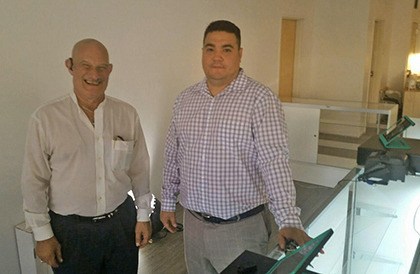Buoyed by the Washington State Liquor and Cannabis Board’s 2015 announcement that it would issue two more marijuana retail licenses in addition to the two allowed at the time in cities, Kirk Edwards last October turned his attention to remodeling the long vacant store at 404 Auburn Way S.
Working fast, Edwards said, because he’d been told the third and fourth licenses would go to whatever prospective store was ready to pass inspection first.
“We had to break ground. We were told it was like a race, and that whoever could build out, be ready and could pass inspection would get the third and the fourth license, and we wanted to win the race,” said James Sloop, a consultant helping Edwards.
In three weeks, Sloop noted, the store passed inspection, and then “we did everything we were supposed to do – communicated with the City, communicated with the WSLCB, everything to make sure we were not wasting our time.”
But last week, to their surprise and dismay, the men learned that the Auburn City Council was going to vote Aug. 1 on an ordinance that was to morph the existing moratorium on any retail marijuana stores beyond the two already in Auburn into an outright ban – thus driving a spike through their plans to open the Marijuana Depot.
The proposed ordinance also described relocating Green Solutions Place from its controversial-and- lawsuit-generating site on Muckleshoot Hill to an industrial area in the city.
Reconvening after a closed-door session Monday, however, the City Council tabled the ordinance for future action because of lingering but unspecified concerns about Green Solutions Place.
Last week, City attorney Dan Heid said the Marijuana Depot does not qualify to open in Auburn.
“They’re covered by the ban, or moratorium – enacted by the City in May because of concerns about the LCB – and they’re not allowed,” Heid said. “The council could open the door for them, but that would take a different action.”
Philip Dawdy, another consultant helping Edwards, said the WSLCB issued the license to KF Industries in May of 2016. Whereas the City of Auburn issues permits to such businesses, it’s not responsible for issuing them business licenses.
Perhaps Edwards may be excused for feeling a bit whipsawed between the City and its retail marijuana moratorium and the WSLCB, which does not recognize them.
“We’re caught in the middle, and it’s extremely frustrating, and very difficult to wind down the road to the finish line. Every time you try to get to a place, another hurdle. Having owned 22 businesses in my life, I’ve gotten used to that. You just simply try to work through it and work with the people that put up the hurdles,” Edwards said.
After state voters passed I-502 in November 2012, allowing recreational retail marijuana sales, Sloop said, they tried to get into the first group vying for retail marijuana licenses via the state’s lottery system but without success.
“When we started in November of last year, we were ready for the second round, and immediately signed a lease on this place for 10 years with a personal guarantee. The state had issued the licenses, so there was a good possibility we could get in here,” said Sloop.
Sloop said he and Edwards met with City staff and left feeling assured that opening the store wouldn’t be a big problem.
“They even said, ‘if you’ll just be patient and wait it out, we’ll see what we can do to help you out,’ ” Sloop said, adding that that encouraging phrase morphed into ‘sorry, we’re not offering permits to any licenses related to the LCB.’”
Edwards, who is three weeks away from opening a recreational marijuana store in the city of Lacey, said he has been a businessman for more than 25 years, owned medical companies, car dealerships, restaurants, been a consultant with a businesses brokerage and worked with buyers and sellers.
He said the store would employ 30 or more people at wages of $15 an hour and more. It would also rejuvenate a business complex sorely plagued by loitering, a homelessness encampment and other issues.
“That building’s been vacant there for a couple of years, and it has a lot of problems, and police officers have told me there’s always problems out there. Having security at that location would drive a lot of the problems away,” Edwards said.
“We want to be good members of this community. We want to work with the community, we want to work with the government. We’re going to treat this as an everyday business. Also, we’re going to clean this place up. You can ask the police – this is not the most desirable area. It’s been vacant for three years because nobody will come here,” Edwards said.



